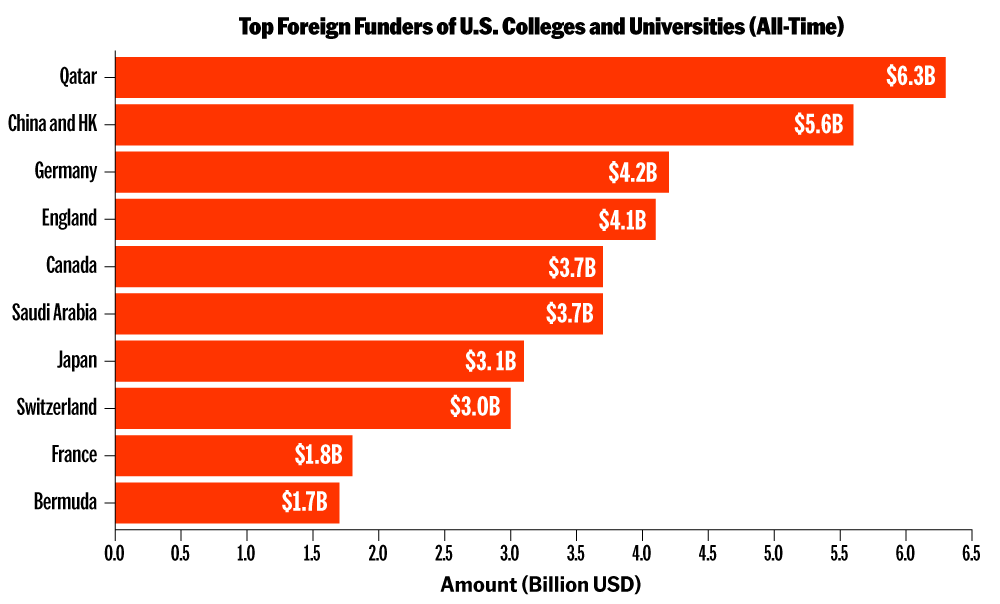How Qatar Bought Influence in America: A Report by The Free Press
A new report in The Free Press reveals how Qatar has spent nearly $100b over two decades to influence U.S. politics, media, and academia, leveraging ties to Hamas, the Muslim Brotherhood, and Iran
In a detailed investigation by Frannie Block and Jay Solomon, The Free Press reveals how Qatar has spent nearly $100 billion over the past two decades to gain influence in American politics, media, and academia. According to the report, this vast expenditure has allowed the tiny Gulf nation to shape U.S. policy, sway public opinion, and infiltrate Washington’s corridors of power. From Congress to universities and newsrooms, Qatar’s strategic investments and lobbying efforts have transformed its position on the global stage, despite its controversial ties with groups like Hamas, the Muslim Brotherhood, and its diplomatic ties to Iran.

Massive Investments & Global Influence
According to the report, Qatar's influence operation is unparalleled in its scale and ambition. The country has invested billions of dollars into American infrastructure, including real estate, energy projects, and defense contracts. Notably, the report highlights Qatar’s strategic role in the U.S. military by funding the Al Udeid Air Base, an essential hub for American operations in the Middle East. The base is a critical logistical point for the Pentagon’s operations in the region, and Qatar has funded more than $8 billion since 2013 to maintain it. Through these investments, Qatar has ensured its geopolitical interests are tightly aligned with U.S. national security objectives.
The Power of Lobbying and PR
The report found that Qatar has spent over $225 million since 2017 on lobbying efforts to influence U.S. politicians, think tanks, and media outlets. This substantial investment has allowed Qatar to become a dominant player in Washington, D.C., surpassing other powerful foreign interests like Israel. According to the authors, Qatar’s lobbying efforts have fostered relationships with high-profile political figures and institutions. For example, former U.S. officials, including Trump’s chief of staff, Susie Wiles, and FBI Director Kash Patel, have had direct ties to Qatar, either through lobbying firms or as paid consultants. These efforts have helped Qatar gain the favor of key lawmakers, further embedding itself in the political landscape.
A Covert Influence on Media and Academia
According to the report, Qatar has also wielded its financial influence over media and academic institutions to shape American public perception. Through its media powerhouse, Al Jazeera, the Gulf state has been able to spread its political messaging globally, offering a platform for groups like Hamas and Hezbollah. Al Jazeera, which broadcasts to over 430 million people, has been a critical tool for Qatar to influence public opinion across the Middle East and beyond. The report also highlights Qatar’s extensive investments in U.S. higher education, including a $760 million donation to Georgetown University to open a campus in Doha. This has raised concerns about Qatar’s influence on academic freedom and its potential to sway the curriculum, especially given the restrictions on speech within Qatar itself, such as laws prohibiting criticism of the royal family or the state.

A Geopolitical Power Play
While Qatar’s substantial spending has bought it considerable influence, the report highlights growing concerns over the long-term impact on U.S. foreign policy. According to the authors, critics argue that Qatar’s financial clout has compromised American sovereignty, particularly through its support for terrorist groups like Hamas and its deepening ties with Iran.
The report notes that Qatar has long been a key financial supporter of Hamas, a group responsible for the October 7, 2023 massacre in Israel, which left 1,200 dead and 250 kidnapped. Members of Qatar’s royal family have expressed support for Hamas, such as Sheikha Moza Bint Nasser, the mother of Qatar’s emir. After the death of Yahya Sinwar, the former Hamas leader and mastermind of the October 7, 2023 massacre, she wrote on X, “He will live on, and they will be gone.”
Moreover, Qatar has been criticized for its ties to Iran, a country that supports groups like Hezbollah, further complicating U.S. foreign policy in the region. The report found that U.S. policymakers, including key figures in the Trump administration, have overlooked these connections in favor of strengthening ties with Qatar due to its financial contributions and military support.
The authors explain how Qatar’s country’s vast spending network and strategic investments have allowed it to reshape political and public outcomes in Washington, D.C. The investigation reveals the extent to which money can transform a nation’s standing on the world stage and alter the political dynamics of powerful countries like the U.S.
Read the full investigation in The Free Press.



